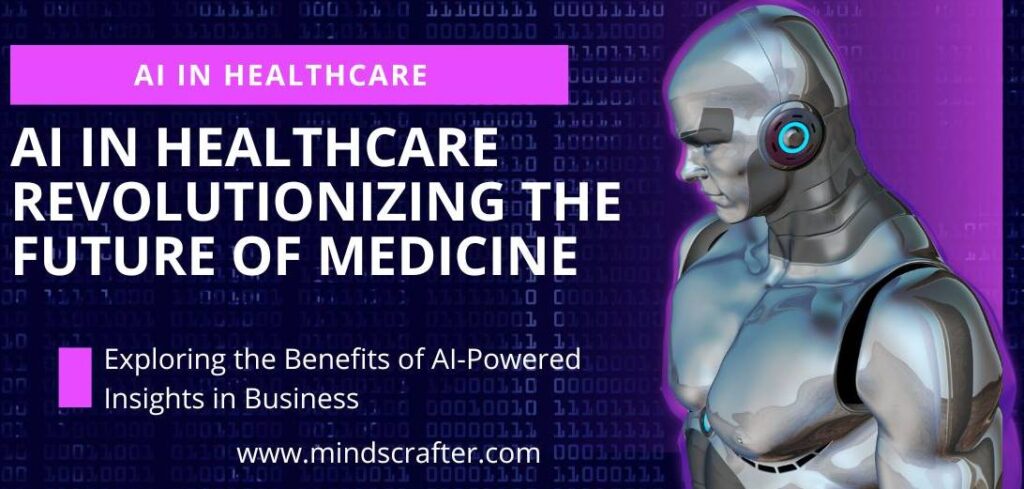Revolutionizing the Future of Medicine | Introduction:
Artificial intelligence (AI) is reshaping the healthcare industry, bringing forth new opportunities to enhance patient outcomes, streamline administrative tasks, and reduce costs. This short article explores the exciting potential of AI in healthcare and its transformative impact on the future of medicine. This article will also discuss the various aspects of AI adoption, its applications in patient care and administrative tasks, the benefits and challenges it presents, and finally, a glimpse into the future of AI in healthcare.

What is AI in Healthcare?
AI in healthcare refers to using artificial intelligence technology to improve patient care, streamline administrative tasks, and reduce costs. It encompasses various applications, such as machine learning algorithms that analyze medical images to diagnose diseases or natural language processing techniques that enhance patient communication and automate administrative processes. By revolutionizing the healthcare industry, Artificial Intelligence has the potential to make healthcare more efficient, effective, and accessible for both patients and providers.
AI in Patient Care and Treatment:
AI is already making significant strides in patient care and treatment. For instance, machine learning algorithms can analyze medical images, aiding doctors in making more accurate diagnoses and devising effective treatment plans. Moreover, Artificial Intelligence enables remote patient monitoring, allowing healthcare providers to track patients’ progress and adjust treatment plans as necessary. Additionally, AI-powered chatbots and virtual assistants facilitate improved patient management and seamless communication with healthcare providers.
AI in Administrative Tasks and Operations:
In addition to patient care, Artificial Intelligence is transforming the administrative side of healthcare. AI-powered systems can optimize resource management within hospitals and clinics, encompassing appointment scheduling and inventory management. This not only reduces costs but also enhances patient outcomes. Furthermore, Artificial Intelligence can analyze patient data, identifying patterns that empower healthcare providers to make informed decisions about patient care. Overall, Artificial Intelligence has the potential to revolutionize healthcare by improving patient outcomes and making it more accessible and affordable for everyone involved.
Benefits and Challenges of AI in Healthcare:
While AI holds immense potential for transforming healthcare, it also poses challenges that must be addressed. One significant concern revolves around bias in AI algorithms, which could lead to unequal treatment of patients. Additionally, there are concerns regarding data privacy and security since AI systems rely on vast amounts of sensitive patient data. However, with proper regulation and oversight, these challenges can be overcome, enabling the realization of the benefits of AI in healthcare. These advantages include improved patient outcomes, efficient resource management, and the delivery of personalized and effective treatments.
The Future of AI in Healthcare:
The rapid advancements in artificial intelligence are shaping the future of healthcare. AI has the capability to revolutionize healthcare delivery, ranging from enhanced patient outcomes to streamlined administrative tasks. By leveraging AI, healthcare providers can analyze extensive datasets to identify patterns and make more accurate diagnoses. Additionally, AI empowers healthcare professionals to personalize treatments based on patient’s unique characteristics, leading to improved outcomes. While challenges must be addressed, the future of AI in healthcare is promising and full of potential.
AI Ethics in Healthcare:
As artificial intelligence (AI) becomes increasingly integrated into healthcare, it is crucial to address the ethical implications of its implementation. AI Ethics in healthcare focuses on ensuring that the development and deployment of Artificial Intelligence technologies uphold ethical standards, prioritize patient welfare, and protect against potential biases or discriminatory practices. Ethical considerations in AI encompass issues such as transparency, accountability, privacy, fairness, and the impact on human autonomy.
Moreover, it is essential to establish guidelines and regulations that govern the use of Artificial Intelligence in healthcare to ensure that these technologies are used responsibly and for the benefit of patients and society as a whole. By addressing Artificial Intelligence Ethics in healthcare, we can build a foundation of trust, promote equitable access to care, and navigate the complexities associated with the ethical challenges presented by Artificial Intelligence in healthcare.
Software and Websites for AI in Healthcare:
As Artificial Intelligence continues transforming the healthcare industry, various software and websites have emerged to support its implementation. These tools provide healthcare professionals with advanced capabilities to harness the power of Artificial Intelligence. Some notable examples include:
- IBM Watson Health: IBM Watson Health offers AI-powered solutions for healthcare organizations, enabling them to leverage data analytics, machine learning, and natural language processing to improve patient care and research outcomes.
- Google DeepMind Health: Google DeepMind Health focuses on utilizing AI to develop innovative solutions for healthcare providers, such as predictive models and clinical decision support systems, to enhance patient care and management.
- Zebra Medical Vision: Zebra Medical Vision specializes in developing AI algorithms for medical imaging analysis, aiding in the early detection of diseases and providing accurate diagnoses.
The Multifaceted Impact of AI on Healthcare:
Artificial Intelligence (AI) is making a transformative impact on healthcare, with its influence being felt across a wide range of applications. Here’s a summary of the key areas we’ve discussed:
1. Predictive Analytics:
AI’s ability to analyze vast amounts of data enables the prediction of potential health issues, facilitating early intervention and improving treatment outcomes.
2. Medical Imaging and Diagnostics:
AI algorithms are enhancing the precision of medical image analysis, leading to more accurate and earlier diagnoses.
3. Drug Discovery:
AI is expediting the traditionally lengthy drug discovery process, predicting how different compounds will behave and potentially leading to more effective treatments.
4. Personalized Medicine:
By analyzing a patient’s genetic information, AI can recommend personalized treatment plans, improving the efficacy of interventions and patient outcomes.
5. Health Monitoring:
Wearable devices and mobile apps powered by AI can monitor health metrics in real-time, alerting users or healthcare providers of any anomalies.
6. Telemedicine:
AI is enhancing virtual health consultations, making healthcare more accessible, particularly in the wake of the COVID-19 pandemic.
7. Robotic Surgery:
AI-assisted robotic surgery can perform complex procedures with high precision, improving surgical outcomes.
8. Administrative Tasks:
AI can increase efficiency in healthcare and allowing healthcare professionals to focus more on patient care.
9. Mental Health:
AI-powered chatbots and apps can provide mental health support, supplementing traditional mental health services.
10. Medical Research:
AI can analyze vast amounts of research data to identify patterns and insights, accelerating scientific discovery.
11. Medical Diagnosis:
AI is improving the speed and accuracy of medical diagnoses. It also enables early detection of conditions and faster treatment decisions.
12. Patient Experience:
AI is transforming the patient experience, personalizing healthcare treatments and managing chronic conditions.
13. Healthcare Data Management:
AI is streamlining healthcare data management, optimizing hospital efficiency, and improving treatment.
14. Insurance:
In the insurance sector, Artificial Intelligence is streamlining processes, detecting fraud, and personalizing insurance plans based on individual health data.
AI in every area is acting as a catalyst for improvement and innovation. Further, future healthcare is more predictive, personalized, and accessible.
Cardiovascular Risk Factors Using Deep Learning Algorithms:
I was reading a blog posted by Lily Peng MD PhD, Product Manager, Google Brain Team with title “Assessing Cardiovascular Risk Factors with Computer Vision”, and found very interesting for this article.
The post mainly discusses the use of deep learning techniques to predict cardiovascular (CV) risk factors and events using retinal images. By training algorithms on a large dataset, researchers were able to accurately predict risk factors such as smoking and blood pressure from retinal images. The algorithm also showed promising results in predicting the risk of a CV event directly.
The post highlights the importance of “opening the black box” by using attention techniques to understand how the algorithm makes its predictions, providing doctors with more confidence and generating hypotheses for future research. This approach may represent a new method of scientific discovery, and further work is needed to validate and expand the algorithm’s capabilities. The video on the same topic is as under for more understanding of the AI in healthcare.

Pingback: AI Algorithms
Pingback: Artificial Intelligence Scope in Pakistan